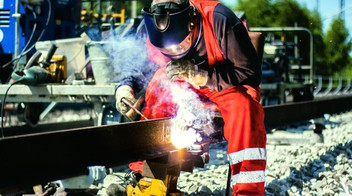Markets and strategy
With the Strong Rail strategy, DB Cargo is committing to its social responsibility and making a meaningful contribution to the transport and climate policy targets in Germany and Europe. It is DB Cargo’s target to shift transport from road to rail for its customers. This is in line with the guiding principle of the Strong Rail strategy, namely a shift in the mode of transport to rail for a sustainable climate and mobility transition.
The aim of the Strong Cargo strategy is to strengthen DB Cargoʼs position in the long term so that it can make the necessary contribution to achieving the goals. The action plan is designed according to the slogan “Europe needs a strong rail logistics provider. For the climate and for a sustainable economy.” In this way, DB Cargo makes a significant contribution to increasing the modal share of rail in the German and European transport market, while also improving its own economic sustainability.
In order to achieve profitability and competitiveness, DB Cargo will transform its business model. It shows that the highly complex joint production system has not yet been able to respond flexibly to customer requirements within the framework of the current infrastructure sufficiently. The result is shrinking productivity and heavy additional financial burdens, which have a drastic impact on profits. DB Cargo must transform itself in order to become profitable and competitive again. In order to enable DB Cargo to respond more quickly to these challenges and customer requests, the business model is to be adapted in such a way that smaller, more focused business areas will emerge in the future. This customization is based on business sectors/customer groups. In addition, single wagon transport is carrying out a close exchange of services with all business areas. These business areas receive comprehensive autonomy, responsibility and all the resources for their business. This drastically reduces the complexity of the production model, which significantly reduces costs and improves competitiveness.
- Rail logistics: To strengthen its market presence as a rail logistics service provider, DB Cargo systematically offers its customers industry-specific services in its customers’ supply chains. These are logistics solutions that essentially include a rail service and supplement it with additional modules (for example road transport, warehousing and other individual logistics services). DB Cargo consistently renews structures and develops commercial models of responsibility for this purpose.
- Single wagon transport: The single wagon network is a key component of today’s rail freight transport in Germany and Europe, but cannot be operated on a purely commercial basis as a full-coverage network given the current general framework. As a result, single wagon transport will be further developed into a supply-oriented, standardized and resilient network, taking into account the funding provided for in the 2024 Federal budget, and will be organized significantly more cost-efficiently. In the medium and long term, the efficiency of the system will also increase with new technologies such as the digital automatic coupling (DAC).
- Combined transport: Despite the economic declines, combined transport is the market of the future in rail freight transport. In order to be able to offer its customers a competitive service, DB Cargo also intends to implement structural measures in the coming years.
In addition, DB Cargo will invest in modern multisystem locomotives and new car technologies. Due to the progress made in digitalization and automation, DB Cargo will also be able to carry out processes in rail transport, i.e. train formation, car treatment and maintenance, much more effectively and quickly, thereby increasing its competitiveness.
Thanks to modern transport equipment that meets market and customer requirements, DB Cargo is able to integrate itself deep into customers’ logistics chains. DB Cargo is therefore advancing the development of its freight cars intensively. In addition to freight cars and superstructures, loading and unloading facilities as well as handling technologies are designed and implemented together with customers. DB Cargo relies both on its own developments and on cooperations with strategic partners.


